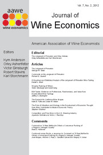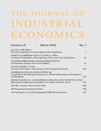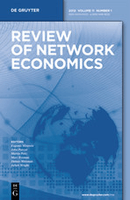
American Economic Journal-Microeconomics
Scope & Guideline
Transforming Research into Real-World Microeconomic Solutions
Introduction
Aims and Scopes
- Microeconomic Theory and Applications:
The journal publishes research that develops and applies microeconomic theories to various contexts, exploring fundamental concepts such as utility, demand, and market structures. - Behavioral Economics and Decision-Making:
Research in this area investigates how psychological factors influence economic decisions, including biases, heuristics, and the impact of social norms on individual behavior. - Market Structures and Competition:
This includes studies on oligopoly behavior, monopolistic competition, and the effects of market entry and exit on pricing and efficiency. - Experimental and Empirical Economics:
The journal emphasizes empirical studies and experimental methods to test economic theories and assess real-world phenomena, providing evidence-based insights. - Regulation and Policy Analysis:
Research focusing on the implications of regulatory frameworks and policy decisions on market outcomes, consumer behavior, and welfare economics. - Information Economics and Market Design:
Exploring how information asymmetries affect economic interactions, this area includes studies on auction design, contract theory, and information disclosure.
Trending and Emerging
- Dynamic and Adaptive Models:
There is an increasing focus on dynamic models that take into account learning, adaptation, and strategic interactions over time, reflecting the complexities of real-world economic behavior. - Behavioral Insights in Economics:
Research integrating behavioral economics with traditional models is on the rise, emphasizing how cognitive biases and social influences shape economic decisions. - Data-Driven and Machine Learning Approaches:
The application of machine learning and big data analytics in economic research is becoming more prevalent, enabling new insights into consumer behavior and market dynamics. - Environmental Economics and Sustainability:
Emerging themes include the economic implications of environmental policies and sustainability practices, reflecting the growing importance of climate-related issues in economic research. - Platform Economics and Digital Markets:
Research focusing on the unique characteristics of platform markets, including two-sided markets, digital competition, and network effects, is gaining significant attention. - Interdisciplinary Approaches:
There is a trend towards interdisciplinary research that combines insights from economics with other fields such as psychology, sociology, and political science, enhancing the understanding of complex economic phenomena.
Declining or Waning
- Traditional Industrial Organization:
Research focusing on classic models of industrial organization, including static analyses of market power and monopolistic practices, has seen a decline as newer approaches and methodologies gain traction. - Static Game Theory:
The emphasis on static models of game theory, which do not account for dynamic interactions or learning processes, appears to be waning in favor of more complex and dynamic models. - Simple Market Models:
Studies that utilize overly simplified market models without considering real-world complexities are becoming less prevalent, as researchers seek more nuanced approaches. - Historical Economic Analysis:
There is a noticeable decline in papers focused on historical economic analysis, as the journal shifts towards more contemporary and applied economic issues. - Basic Consumer Theory:
Research centered on basic consumer theory, which does not incorporate behavioral insights or modern empirical techniques, is becoming less common in favor of more integrative approaches.
Similar Journals

JOURNAL OF REGULATORY ECONOMICS
Pioneering Research in the Economics of RegulationJOURNAL OF REGULATORY ECONOMICS, published by SPRINGER, is a pivotal platform for scholars in the field of economics and econometrics. With an ISSN of 0922-680X and an E-ISSN of 1573-0468, this journal has been a cornerstone since its inception in 1989, showcasing research that bridges regulatory theory and practice. Operating from its base in the Netherlands, the journal is ranked in the Q2 quartile for 2023 in the economics and econometrics category, reflecting its status and impact within the academic community. Although it does not currently offer open access, it remains a key resource for researchers and practitioners interested in regulatory policy implications and economic analysis. With Scopus rankings placing it at #369 out of 716 in the relevant field, the JOURNAL OF REGULATORY ECONOMICS continues to foster significant contributions that shape regulatory frameworks and their economic underpinnings, making it essential reading for anyone involved in the fields of economics, finance, and policy-making.

Journal of Wine Economics
Navigating the Complexities of Wine Market DynamicsJournal of Wine Economics, published by Cambridge University Press, is a leading interdisciplinary journal dedicated to advancing the understanding of the economics of wine through rigorous research and analysis. With an ISSN of 1931-4361 and E-ISSN 1931-437X, this journal plays a crucial role in the intersection of economics, business, and food science, offering insights relevant to both academia and industry. The journal has garnered recognition, achieving a Q2 ranking in the categories of Business, Management, and Accounting, Food Science, and Horticulture, as reflected in its Scopus rankings, with significant placement in the percentile rankings within these fields. As of 2023, it continues to contribute to the online discourse on wine economics while fostering a collaborative environment for researchers, professionals, and students interested in the intricacies of this vibrant sector. Although it does not currently provide open access options, readers can engage with its valuable content through academic libraries and institutional subscriptions, making it an essential resource for those seeking to deepen their expertise in wine economics.

REVIEW OF INDUSTRIAL ORGANIZATION
Elevating standards in industrial organization scholarship.REVIEW OF INDUSTRIAL ORGANIZATION, published by SPRINGER, is a premier journal dedicated to advancing the field of industrial organization and related disciplines. With its ISSN 0889-938X and E-ISSN 1573-7160, this esteemed publication supports the dissemination of high-quality research from 1984 to the present, encompassing a wide range of topics such as economics, technology management, and organizational behavior. Positioned in the Q2 category across multiple disciplines, including Economics and Econometrics, Strategy and Management, and Organizational Behavior, it reflects its impactful contributions to academia and business practice. The journal provides valuable insights for researchers, practitioners, and students interested in the dynamics of market structures, competition, and regulatory issues. As part of the Scopus database, it ranks favorably, allowing authors to contribute to a recognized platform that drives innovation and policy in the industrial sector. While it does not offer open access, the journal's robust editorial standards ensure that published work meets rigorous scholarly criteria, making it an essential resource for those aiming to deepen their understanding of industrial organization.

REVUE ECONOMIQUE
Advancing Knowledge in Economics and FinanceREVUE ECONOMIQUE, published by PRESSES FOND NAT SCI POLIT in France, is a distinguished academic journal with an ISSN of 0035-2764 and an E-ISSN of 1950-6694. Established in 1974, the journal has evolved significantly over the years, focusing on a diverse range of topics within the field of economics, econometrics, and finance. With its commitment to presenting in-depth research and innovative perspectives, REVUE ECONOMIQUE serves as a vital resource for scholars, professionals, and students seeking to enhance their understanding of economic theories and practices. Although it is currently categorized in the Q4 quartile, ranking 241 out of 288 in the field, the journal aims to foster new dialogues and disseminate valuable insights that contribute to the economic discourse. The journal is not available as open access, but its rich repository of articles continues to attract readers interested in the complexities of economic dynamics. For more information, you can refer to their address at 27 RUE SAINT-GUILLAUME, 75341 PARIS 07, FRANCE.

Netnomics
Innovating Research in Networked EconomiesNetnomics, published by SPRINGER, is a pivotal academic journal focusing on the intersection of economics, computer networks, and information systems. With its ISSN 1385-9587 and E-ISSN 1573-7071, this journal strives to address current trends and research challenges in the digital economy, effectively capturing the dynamics of online markets and digital goods. Although open access options are not available, Netnomics maintains an impressive standing, ranking in the Q3 category for its fields in Computer Networks and Communications, Economics and Econometrics, and Information Systems. Despite its discontinuation of coverage in Scopus from 2005 through 2021, the journal continues to contribute valuable insights, making it a relevant source for researchers, professionals, and students eager to explore the evolving landscape of economic interactions in a digitalized world. With a focus on empirical research and theoretical analysis, Netnomics provides a platform for advancing knowledge at the confluence of technology and economic theory, critical for professionals navigating the complexities of today's economy.

JOURNAL OF INDUSTRIAL ECONOMICS
Illuminating the path of economic discourse.Welcome to the Journal of Industrial Economics, a premier academic publication dedicated to advancing the field of industrial economics through rigorous research and scholarly discourse. Published by Wiley, this esteemed journal has been a vital resource since its inception in 1978, offering insights into market structures, firm behavior, and regulatory frameworks. With its impact reflected in the 2023 quartiles, the journal stands prominently in Q1 in Business, Management and Accounting and Q2 in both Accounting and Economics and Econometrics. Researchers and scholars will find the journal’s rich repository of articles invaluable for understanding complex economic phenomena, while its strategic focus on empirical evidence encourages interdisciplinary collaboration. Despite its subscription-based model, the journal ensures widespread access to its vital contributions to the field, making it integral for both current and aspiring professionals eager to navigate the intricacies of industrial economics. Explore cutting-edge research and join a community dedicated to scholarly excellence at the Journal of Industrial Economics.

Review of Network Economics
Innovating methodologies for a connected world.Review of Network Economics is a distinguished journal published by Walter de Gruyter GmbH, specializing in the fields of economics and econometrics. Established in 2010, this journal has emerged as a pivotal platform for disseminating innovative research and critical insights pertaining to network economics, including its applications in finance and social sciences. Although currently listed in the Q4 quartile in the category of Economics and Econometrics with Scopus ranking 587 out of 716, the journal aims to foster academic discourse and facilitate the exploration of new methodologies and theoretical frameworks that shape current understanding in the field. With its commitment to openness and accessibility, the journal also provides authors with opportunities for sharing their findings globally, despite the absence of specific open access options. As industry professionals, researchers, and students continue to navigate complex economic landscapes, Review of Network Economics serves as an essential resource for the latest methodologies, case studies, and theoretical advancements in network analysis.

Geneva Risk and Insurance Review
Connecting academia and practice in risk analysis.Geneva Risk and Insurance Review, published by Palgrave Macmillan Ltd, stands as a premier academic journal dedicated to advancing the understanding of risk and insurance through rigorous research and analysis. With an ISSN of 1554-964X and an E-ISSN of 1554-9658, this journal has carved out a notable niche in the fields of Accounting, Business Management, and Finance, as reflected by its 2023 category quartiles and Scopus rankings, positioning it among the top echelons of scholarly output in these disciplines. The journal is renowned for its commitment to open access, enhancing accessibility for a diverse audience of researchers, professionals, and students keen to explore the complexities of risk dynamics. Since its inception in the mid-1970s, and with recent converged years leading up to 2024, it has consistently provided a platform for groundbreaking studies that shape policies and practices in the insurance sector. The journal's reputation for excellence and influential contributions makes it an essential resource for those engaged in the evolving discussions surrounding risk management and insurance strategies.

EXPERIMENTAL ECONOMICS
Catalyzing new ideas in the realm of experimental economics.EXPERIMENTAL ECONOMICS is a leading journal dedicated to the advancement of knowledge in the field of economic experimentation and behavioral finance. Published by SPRINGER, this esteemed journal plays a pivotal role in disseminating high-quality research that explores the intersection of economics and experimental methodology. With an impressive Q1 ranking in the category of Economics, Econometrics and Finance (miscellaneous) and a Scopus rank of #52 out of 242, it stands out as a premier outlet for innovative scholarship. Although it operates under a subscription model, the journal is committed to providing its readership with insights into rigorous experimental designs and their applications in economic theory and practice. Researchers and practitioners alike can benefit from its extensive array of studies, contributing to the ongoing dialogue and development within the economic landscape. Covering a scope that converges from 2003 to 2024, EXPERIMENTAL ECONOMICS is not just a repository of knowledge but a catalyst for new ideas, thereby inviting professionals, students, and scholars to engage with cutting-edge research that shapes the future of economics.

ECONOMIC THEORY
Innovating Insights in Theoretical EconomicsECONOMIC THEORY is a leading academic journal published by Springer, dedicated to advancing the field of economics through the dissemination of innovative and high-quality research. Established in 1991, this journal has become a crucial resource for researchers, professionals, and students interested in theoretical economics and econometrics. With a strong reputation, it ranks in the Q1 category for Economics and Econometrics as of 2023, exemplifying its influence and contribution to the discourse in the field. The journal operates without Open Access options, ensuring that all published content undergoes rigorous peer-review, maintaining scholarly integrity. Scholars can access the journal's rich compendium of articles that delve into diverse economic theories, providing invaluable insights and fostering academic dialogue. Headquartered in Germany, ECONOMIC THEORY is committed to shaping the future of economic research and serving as a cornerstone in the academic community.